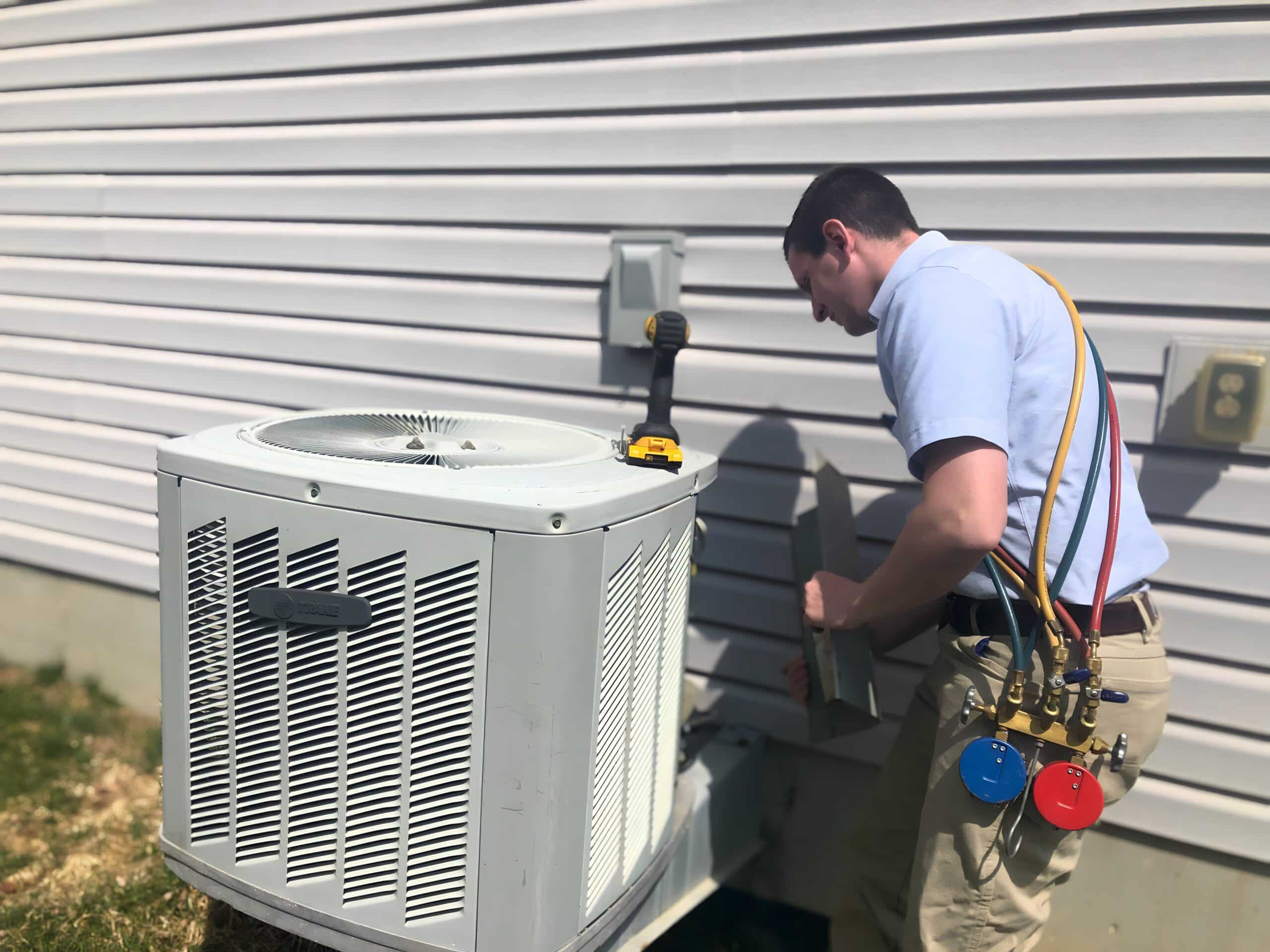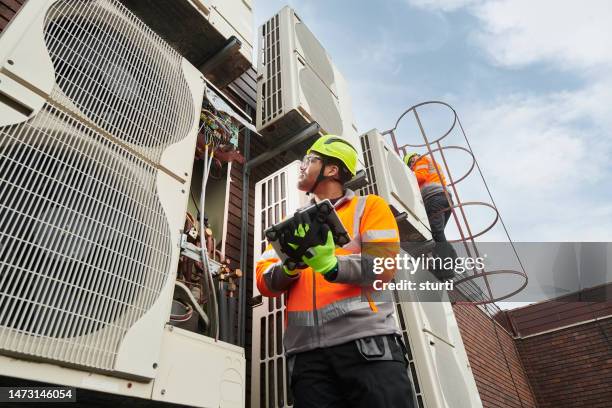5 Must-Know Facts About ductless mini splits Before You Upgrade
5 Must-Know Facts About ductless mini splits Before You Upgrade
Blog Article
Picking In Between a Warmth Pump and Heating System: Key Considerations for Your HVAC Needs
When assessing heating alternatives for a/c needs, the choice in between a heatpump and a furnace can be complicated. Each system uses distinct benefits tailored to specific environments and power performance objectives. Understanding these distinctions is vital for making an enlightened choice. Key aspects such as installation expenses and ecological influence further complicate the option process. Which option absolutely straightens with one's comfort and sustainability preferences? The following areas will certainly check out these factors to consider in information.
Understanding Warmth Pumps: Exactly How They Work and Their Advantages
While numerous property owners think about numerous heating alternatives, comprehending just how warmth pumps function and their benefits can significantly affect their choice. Warm pumps run by transferring warmth instead than generating it. In the winter months, they extract warm from the outdoors air or ground and move it indoors, while in the summertime, they reverse this procedure, cooling down the home by removing warm outside. This twin functionality makes them flexible for year-round climate control.One of the key advantages of heat pumps is their energy effectiveness. They make use of considerably less electrical power compared to standard heater, potentially causing lower utility bills (heat pump replacement ooltewah tn). In addition, heatpump have a smaller sized carbon footprint, making them an eco-friendly selection. They likewise require less maintenance than traditional systems, adding to long-lasting expense financial savings. On the whole, understanding the mechanics and advantages of heatpump can aid home owners make informed decisions regarding their home heating and cooling needs
Discovering Heaters: Types, Procedure, and Benefits
Heating systems come in various kinds, consisting of gas, electrical, and oil designs, each with distinct functional systems. Comprehending these differences is vital, as they affect effectiveness and heating efficiency. Furthermore, heating systems provide various advantages, such as consistent warmth outcome and reliability in cooler environments.
Sorts of Furnaces
Heating unit can vary considerably in layout and operation, with furnaces being a preferred option amongst property owners. There are numerous sorts of heating systems, each using various gas sources and modern technologies. Gas furnaces are common, leveraging all-natural gas to create heat effectively. Electric furnaces, on the other hand, make use of electrical resistance to create heat, commonly favored for their uncomplicated setup. Oil heaters, while less usual, are efficient in locations with restricted gas accessibility (ductless mini splits). Furthermore, condensing furnaces make best use of energy performance by reusing and catching exhaust gases. Each kind operates through a system of heat exchangers and ductwork to distribute cozy air throughout a home. Understanding the distinctions in between these furnace types is essential for notified cooling and heating decisions
Advantages of Heaters
For homeowners seeking reputable warmth during cold months, the benefits of furnaces are considerable. Heating systems provide consistent home heating, making certain even temperatures throughout the home. They are especially reliable in extreme cool, often exceeding heatpump in icy conditions. Different kinds, consisting of gas, electrical, and oil heaters, supply flexibility to meet diverse needs and preferences.Furnaces also tend to have lower initial installation costs compared to heatpump, making them a more available option for lots of. Their robust design contributes to a much longer life-span, with several devices lasting over 15 years with correct upkeep. Furthermore, contemporary heating systems are commonly equipped with innovative technology for boosted performance, which can bring about minimized power bills. On the whole, heating systems continue to be a reliable choice for reliable home heating.

Energy Effectiveness: Contrasting Heat Pumps and Furnaces
When contrasting power efficiency in between heat pumps and heating systems, the Seasonal Power Performance Ratio (SEER) plays a necessary role in figuring out efficiency. In addition, an operational cost evaluation exposes the lasting economic implications of each system. Comprehending these variables can guide property owners in making educated decisions regarding their home heating remedies.
Seasonal Energy Efficiency Ratio
Energy effectiveness plays a crucial role in the decision-making process between heat pumps and heating systems, especially when taking into consideration the Seasonal Energy Performance Ratio (SEER) This metric measures the cooling efficiency of heatpump over an entire cooling period, supplying a standardized means to review efficiency. Greater SEER ratings suggest higher energy performance, converting to reduced energy usage and decreased utility bills. On the other hand, heaters are generally evaluated using the Annual Gas Use Effectiveness (AFUE) score, which shows heating performance. When contrasting these two systems, property owners should prioritize SEER rankings for warm pumps, as they directly effect overall power financial savings and environmental sustainability. A complete understanding of SEER can significantly influence the lasting contentment and cost-effectiveness of the selected heating and cooling solution.
Operational Expense Evaluation
Recognizing the operational costs connected with heatpump and heaters is important for homeowners reviewing their choices. Heat pumps typically use higher power effectiveness, transforming electrical energy right into warmth with very little waste. This results in lower regular monthly utility expenses, especially in modest climates. Alternatively, conventional furnaces, especially gas models, might have reduced ahead of time expenses but can sustain greater functional expenditures in time because of fuel rates and effectiveness ratings.Moreover, heat pumps can work as both home heating and cooling systems, possibly decreasing the requirement for separate cooling and heating units. While first investments for heatpump may be greater, their lasting financial savings in power effectiveness can make them an extra economical selection for many homes. Cautious evaluation of neighborhood power rates is necessary to figure out the ideal alternative.
Installment Prices: What to Anticipate for every Furnace
Installation costs for heater can vary substantially in between warmth pumps and furnaces, influencing house owners' choices. Heatpump typically have higher upfront setup expenses, generally varying from $3,500 to $8,000, depending on the system dimension and complexity of setup. This consists of the outdoor unit, indoor handling system, and required ductwork modifications. On the other hand, furnaces have a tendency to have lower initial costs, averaging in between $2,500 and $6,000, which can be appealing for budget-conscious homeowners. Nonetheless, installment costs can boost if considerable ductwork is required.Moreover, the choice of gas kind for furnaces-- gas, lp, or electric-- can additionally influence setup costs. While warm pumps provide energy performance, their preliminary financial investment might discourage some customers. Ultimately, evaluating installment prices together with long-term financial savings and effectiveness will help property owners in making educated decisions concerning their furnace.
Environment Considerations: Which System Executes Better in Your Location
How do environment conditions affect the effectiveness of heater? The performance of heatpump and furnaces can differ substantially depending upon the local climate. In modest climates, warm pumps succeed by effectively moving heat from the outside air, making them an energy-saving alternative. Nevertheless, their performance decreases in exceptionally cold temperature levels, where they might struggle to draw out enough heat. On the other hand, heaters, especially gas versions, provide constant and reliable heat no matter of exterior conditions, making them better in cooler regions.In locations that experience milder winters months, heatpump can operate efficiently year-round, supplying both home heating and air conditioning. In comparison, areas with harsh winter seasons commonly gain from the robustness of heaters. Ultimately, recognizing the neighborhood environment is important when choosing in between a warmth pump and a heating system, as it Website straight impacts their operational effectiveness and general performance.
Upkeep Demands: Long-Term Take Care Of Warmth Pumps vs. Furnaces
While both heatpump and furnaces call for routine maintenance to assure peak performance, their details requirements and care regimens differ substantially. Heating systems normally need much less frequent focus, with annual inspections being enough to inspect for gas leakages, tidy filters, and examine overall capability. Their easier layout commonly enables uncomplicated repairs.In contrast, heatpump necessitate semiannual upkeep because of their twin function in heating & cooling. This consists of cleansing coils, checking cooling agent levels, and making certain that both the indoor and outside devices work at their ideal. Additionally, warmth pump maintenance usually includes even more intricate elements, making specialist servicing essential.Neglecting maintenance can bring about diminished effectiveness and raised energy expenses for both systems. Inevitably, property owners need to consider these long-lasting treatment needs when choosing between a heatpump and a heating system, as aggressive maintenance can extend the life expectancy and efficiency of either system substantially.
Environmental Effect: Choosing a Sustainable Home Heating Choice
The ecological influence of heating systems is a vital analysis for house owners seeking lasting options. Heatpump are usually a lot more energy-efficient than conventional heaters, as they transfer heat as opposed to create it, greatly lowering carbon visit our website exhausts. By using renewable power resources, such as geothermal or air-source heatpump, property owners can even more lessen their environmental footprint.On the various other hand, all-natural gas furnaces give off greenhouse gases and contribute to air pollution, though they frequently offer greater warmth result. Nonetheless, improvements in modern technology have actually caused the advancement of high-efficiency heaters that minimize emissions.Ultimately, picking a furnace includes weighing effectiveness versus environmental influence. Property owners are encouraged to show on regional energy sources and rewards for eco-friendly systems, ensuring an option that aligns with both personal convenience and ecological duty. The decision affects not only instant convenience yet additionally lasting sustainability and environmental health and wellness.
Regularly Asked Questions
How Much Time Do Warm Pumps and Furnaces Usually Last?
The lifespan of heat pumps typically ranges from 15 to twenty years, while heating systems can last between 15 to thirty years. Regular maintenance considerably affects More hints their durability and performance in supplying heating remedies.
Can I Use a Warmth Pump in Exceptionally Cold Climates?
Heatpump can run in extremely cool climates, but their performance diminishes as temperature levels drop. In such conditions, supplementary heating sources may be required to keep comfortable interior temperatures and guarantee peak performance.

What Is the Noise Level of Warmth Pumps Versus Furnaces?
The noise levels of warm pumps and heating systems differ significantly. Generally, warmth pumps operate more silently than traditional heating systems, making them more effective for those conscious appear, while heaters might produce louder operational sounds throughout home heating cycles.
Are Warmth Pumps Suitable for Both Heating & Cooling?
Heatpump are indeed ideal for both heating and air conditioning (ductless mini splits). They function by moving warmth, offering reliable temperature level control year-round, making them a flexible selection for homeowners looking for an all-in-one a/c service
What Size Heater Do I Need for My Home?
Identifying the proper dimension furnace for a home needs evaluating elements such as square video footage, insulation high quality, regional environment, and the home's layout. Consulting an expert can ensure a precise evaluation and perfect convenience. Warmth pumps normally provide higher power effectiveness, converting electrical power right into heat with minimal waste. In moderate environments, warmth pumps stand out by effectively transferring warmth from the outdoors air, making them an energy-saving choice. Alternatively, furnaces, especially gas models, give trustworthy and constant heat no matter of outdoor conditions, making them more effective in chillier regions.In locations that experience milder winters months, warm pumps can operate properly year-round, providing both home heating and cooling. Warm pumps are typically a lot more energy-efficient than conventional furnaces, as they transfer warmth instead than create it, significantly lowering carbon discharges. By utilizing renewable energy resources, such as air-source or geothermal heat pumps, homeowners can even more lessen their eco-friendly footprint.On the various other hand, all-natural gas heating systems produce greenhouse gases and contribute to air pollution, though they frequently supply greater warm result.
Report this page